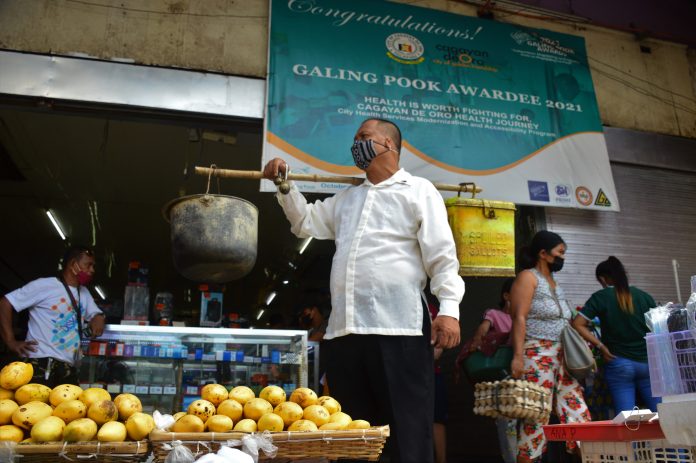Wearing a long-sleeved white “barong,” slacks, and black shoes, Nicolas “Nic” Aca looks out of place in the middle of J.R. Borja St., one of Cagayan de Oro city’s busiest thoroughfares.
With his get-up, the 53-year-old artist could be mistaken for a politician, or a lawyer.
People, including the market vendors, however, noticed that Aca is carrying on his shoulder a small bamboo pole where a cooking pot is attached on one side and a discarded ballot box on the other.
Braving the heat of the sun and the danger of being run over by vehicles, Aca stood on the middle of the four-lane road beside Cogon public market, telling passersby “Boto dili ibaligya” (Don’t sell your votes).”
Aca, resident artist and gallery curator of Capitol University’s Museum of Three Cultures and chairperson of the City Historical and Cultural Commission, said he has been holding his “street version” of voter’s education for the past five elections since 2004.
In previous elections, the artist would roam the city’s business district or would position himself outside the St. Augustine Metropolitan Cathedral, meeting churchgoers.
“This is my way of appealing to people not to sell their votes,” he said, adding that there are candidates who are “highly qualified” but won’t make it on Election Day because they don’t have the money to give away to voters.
“There are many deserving candidates who I know can serve the people better,” he said. “But the electorate won’t even give them a second glance because they could not provide for the ‘ulan-ulan,’” said Aca, referring to the cash given out by candidates on the eve of the elections.
He lamented that in the current situation, only those who are financially capable to mount a campaign have the chance of winning.
What makes it worse is the “culture of utang na loob” (debt of gratitude) prevalent among Filipinos, said the artist.
Because of “utang na loob,” many Filipinos will find themselves obligated to vote for those who have given them cash.
“This has become a cancer, and I hope the next generation will not adopt this practice. We must change it,” he said.
Aca’s props include a cooking pot, symbolizing food, and the ballot box to remind people of their right to vote.
“The props are to show our countrymen that they should vote for who they think are qualified and that they must not accept money that will just be gone,” he said.
Nestor Sablaon, a food vendor at Cogon public market, agrees with Aca.
“We must not sell our vote because it is sacred, and we must choose the right candidates, from the barangay officials to the president,” he said.
“We must not wait for ‘ulan-ulan’ and ‘ayuda’ (government aid). We must do away with them. Most of us can still eat three times a day, even with just ‘bulad’ (dried fish) and ‘ginamos’ (salted fish),” said Sablaon.
He said that if only people would work hard, there would be no need to depend on politicians for help.









